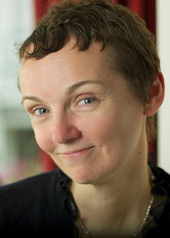...of cures and new insulins
By Kelly Close
 Hello, diaTribe readers!
Hello, diaTribe readers!
We've all heard the promises. In the early days when I was diagnosed with type 1 diabetes, I heard many times that a cure would be "just around the corner." I think it's a common experience for many type 1 patients who have had diabetes for some time - you get used to taking these claims with a healthy grain of salt.
However, what is exciting now is that there are a number of approaches being pursued in cure-based research, ranging from vaccines to the artificial pancreas to immune tolerance therapies to stem cell therapy. As JDRF President Alan Lewis previously discussed with us, many of these pursuits will take quite a while to take hold - though we definitely are much closer than when I was diagnosed nearly 25 years ago.
A newer area of research that we write about in this issue of diaTribe is the "resolution" of diabetes (i.e., it disappears!) for patients with type 2 diabetes. This occurs through a type of weight loss surgery called gastric bypass surgery. This month, longtime diaTribe contributor Sanjay Trehan and I were lucky to interview one of the leading researchers of our time, Dr. Lee Kaplan, a professor at Harvard Medical School and the Director of the Weight Center at Massachusetts General Hospital in Boston. In our conversation, Dr. Kaplan explained the research being done to understand the mechanisms underlying this "resolution" of diabetes observed after surgery - and what's being done to produce the same effects perhaps without surgery at all. We are grateful to Dr. Kaplan for leading this research - we will certainly be following this area closely, particularly to see if some people with type 2 diabetes without weight problems could benefit from procedures like this.
Even without imminent cures on the horizon, we're excited about new products in the pipeline. Notably, in this issue, we explore a basal (long-acting) insulin that only needs to be taken every few days! Other upcoming products that we'll profile soon include a once-weekly version of Byetta (now officially dubbed Bydureon and currently awaiting approval from the FDA) and even some potentially once-monthly drugs (XOMA 052, which treats the inflammatory processes that underlie type 2 diabetes - and that possibly could help even patients with type 1 diabetes, although the research is very early stage). While not in the realm of "cure," developments such as these are crucial because they enable more alternatives for patients depending on what we all need. I like the idea of more individulized diabetes management to help me with all my challenges - as well as diabetes management that is easier for my doctors, educators, and me. Thanks to all the scientists and researchers pursuing new technologies and therapies on our behalf. And ... for all of us, here's to a day where none of these will be needed anymore.
Yours,
Kelly L. Close







